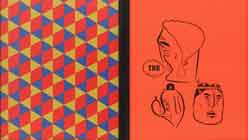Welcome to Help Desk, where I answer your queries about making, exhibiting, finding, marketing, buying, selling — or any other activity related to — contemporary art. Together, we’ll sort through some of art’s thornier issues. Email helpdesk@dailyserving.com with your questions. All submissions remain strictly anonymous and become the property of Daily Serving.
I am currently attending art school (RISD) on the East Coast to receive a BFA in painting. I will be a junior this coming year and feel that things have really started to pick up. The first half of my undergraduate education has gone fairly well. Foundation year was rigorous and last year I explored a lot within my own work. I have multiple on-campus jobs and am beginning to feel good about my contact and personal relationships with the faculty. Besides my own personal goals to read a lot and really hit the ground running in the studio, I was wondering if you had any advice on what I can do to make the most out of my remaining two years in undergrad? Specific class topics? Outside experiences? Maybe taking advantage of the close vicinity to Boston and New York? Any advice would be great.
I’m glad to hear that you feel good about how things are going in general. Art school can be tough and competitive, but it sounds like you’re on an even keel and ready to work on your next steps. It’s been a long time now since I was an undergrad, but in order to answer your question I spent some time thinking about the beneficial things I did — and the things I wish I had done — when I was in school. Below are some ideas for you to consider, which I have divided into the three categories of career, artwork, and personal development.

Barry McGee, Untitled #29, 2002.
Career: I like that you have on-campus jobs and are cultivating good relationships with faculty. When you graduate, you’re going to run into a lot of people who will say, “Oh, you went to RISD? Do you know Professor X?” and it may be helpful if you’re able to say, “Yes.” Make sure that you get at least a little face time with all of the people in your own department.




